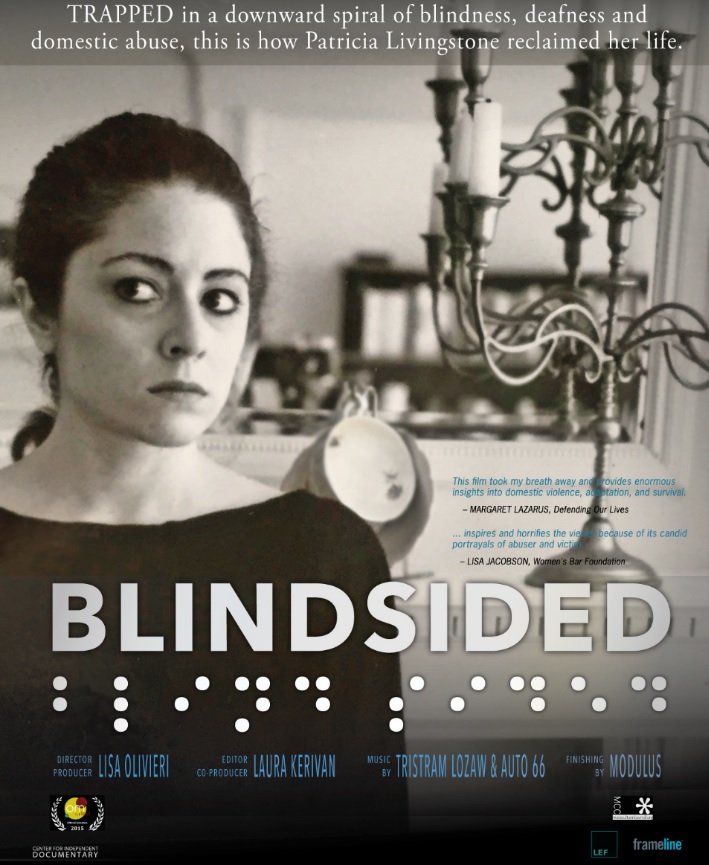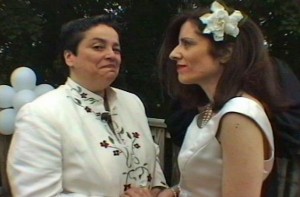In “Blindsided,” woman must overcome disabilities, domestic violence in same-sex relationship

Film poster
Filmmaker Lisa Olivieri turned her camera on Patricia Livingstone, a lesbian artist who was facing huge obstacles — deafness, blindness and domestic violence at the hands of her partners.
Olivieri followed Livingstone for eight years. The result is her documentary “Blindsided,” which was screened by the National Association of Social Workers Massachusetts Chapter.
SocialWorkersSpeak.org talked to Olivieri about how she got involved in such a long-term film project and why social workers should see the documentary.
Q: How did you first get into filmmaking? Can you describe other film projects you have done?
Olivieri: I went to Emerson College to study filmmaking back in the early 90’s. I have worked on other people’s films but this is the first project that I directed. I worked on two documentaries for the PBS series, Frontline, as an associate producer, as well as some documentaries for the History Channel and Discovery .
Q: How did you meet Patricia Livingstone? When did you decide to film her?
Olivieri: I met Patricia through a friend who told me about her. He said she was losing her sight and was trying to paint and compose music. I thought it was really intriguing that a someone who knew that she would eventually lose all of her sight and hearing was trying to do all these projects that require sight and hearing. But I was most interested in how she would cope when she was no longer able to do these things.
Watch the trailer of Blindsided
Q: How difficult was it to follow someone for eight years of filming?
Olivieri: It wasn’t that difficult because I wasn’t filming every day. Sometimes nothing would be happening for months and there wouldn’t be anything to film. The hardest part was trying to edit the story together in a way that made sense, because there were so many themes.
Q: Was the film originally about domestic abuse? Or did that issue arise over the course of filming?
Olivieri: The film was originally about me following Patricia to see how she would cope when she lost her sight and hearing. I didn’t find out about the domestic abuse until many years later — When that story came out, the film got re-edited and re-shaped.

Patricia Livingstone (right) marries but soon is a victim of domestic violence. Photo courtesy of Lisa Olivieri.
Q: What do you think this film will show about same-sex relationships to social workers and others?
Olivieri: Hopefully, it will show that it actually goes on! It’s still a very marginalized issue. There are a few organizations that work with domestic abuse survivors that use Blindsided to train their interns, employees, etc. There is a great organization in Boston (Network/La Red) that has a lot of information about same-sex domestic abuse.
Q: If a person or group is interested in screening “Blindsided” where can they get information?
Olivieri: They can contact me at lisamolivieri@gmail.com. The film is available for screenings and for sale. And there is information on my website: www.lisaolivieri.com and on Facebook.
Q: The film ended on a hopeful note. Patricia was no longer in an abusive relationship, was living independently, and was getting out in her community and doing public speaking about living with a disability. Do you keep up with her? Do you know how she is doing?
Olivieri: Yes, I do. She is doing quite well. She has a full life and is always out doing something! But the most important thing is that she is safe-safe and happy.
| Leave A Comment
Advertisement
Leave a Comment
You must be logged in to post a comment.


